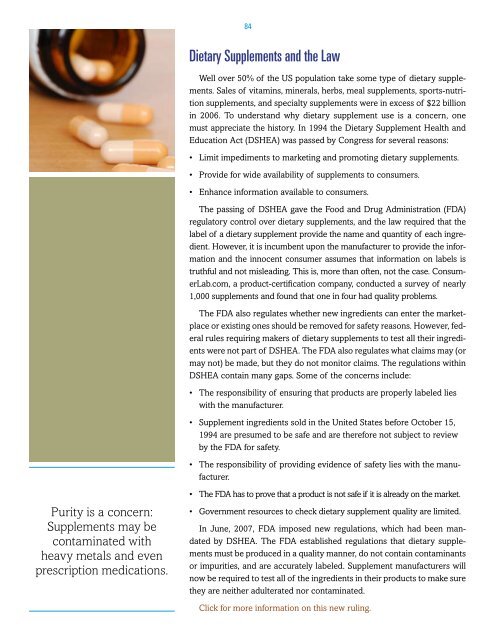special-operations-nutrition-guide
special-operations-nutrition-guide
special-operations-nutrition-guide
You also want an ePaper? Increase the reach of your titles
YUMPU automatically turns print PDFs into web optimized ePapers that Google loves.
84<br />
Dietary Supplements and the Law<br />
Well over 50% of the US population take some type of dietary supplements.<br />
Sales of vitamins, minerals, herbs, meal supplements, sports-<strong>nutrition</strong><br />
supplements, and <strong>special</strong>ty supplements were in excess of $22 billion<br />
in 2006. To understand why dietary supplement use is a concern, one<br />
must appreciate the history. In 1994 the Dietary Supplement Health and<br />
Education Act (DSHEA) was passed by Congress for several reasons:<br />
• Limit impediments to marketing and promoting dietary supplements.<br />
• Provide for wide availability of supplements to consumers.<br />
• Enhance information available to consumers.<br />
The passing of DSHEA gave the Food and Drug Administration (FDA)<br />
regulatory control over dietary supplements, and the law required that the<br />
label of a dietary supplement provide the name and quantity of each ingredient.<br />
However, it is incumbent upon the manufacturer to provide the information<br />
and the innocent consumer assumes that information on labels is<br />
truthful and not misleading. This is, more than often, not the case. ConsumerLab.com,<br />
a product-certification company, conducted a survey of nearly<br />
1,000 supplements and found that one in four had quality problems.<br />
The FDA also regulates whether new ingredients can enter the marketplace<br />
or existing ones should be removed for safety reasons. However, federal<br />
rules requiring makers of dietary supplements to test all their ingredients<br />
were not part of DSHEA. The FDA also regulates what claims may (or<br />
may not) be made, but they do not monitor claims. The regulations within<br />
DSHEA contain many gaps. Some of the concerns include:<br />
• The responsibility of ensuring that products are properly labeled lies<br />
with the manufacturer.<br />
• Supplement ingredients sold in the United States before October 15,<br />
1994 are presumed to be safe and are therefore not subject to review<br />
by the FDA for safety.<br />
• The responsibility of providing evidence of safety lies with the manufacturer.<br />
Purity is a concern:<br />
Supplements may be<br />
contaminated with<br />
heavy metals and even<br />
prescription medications.<br />
• The FDA has to prove that a product is not safe if it is already on the market.<br />
• Government resources to check dietary supplement quality are limited.<br />
In June, 2007, FDA imposed new regulations, which had been mandated<br />
by DSHEA. The FDA established regulations that dietary supplements<br />
must be produced in a quality manner, do not contain contaminants<br />
or impurities, and are accurately labeled. Supplement manufacturers will<br />
now be required to test all of the ingredients in their products to make sure<br />
they are neither adulterated nor contaminated.<br />
Click for more information on this new ruling.


